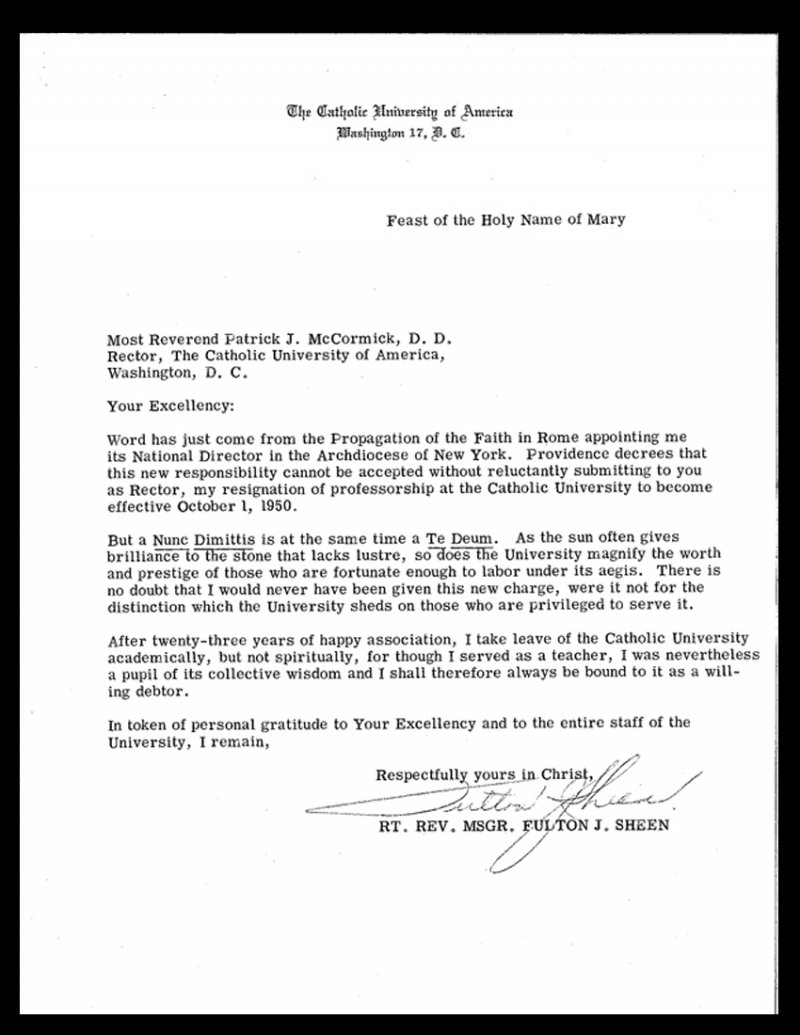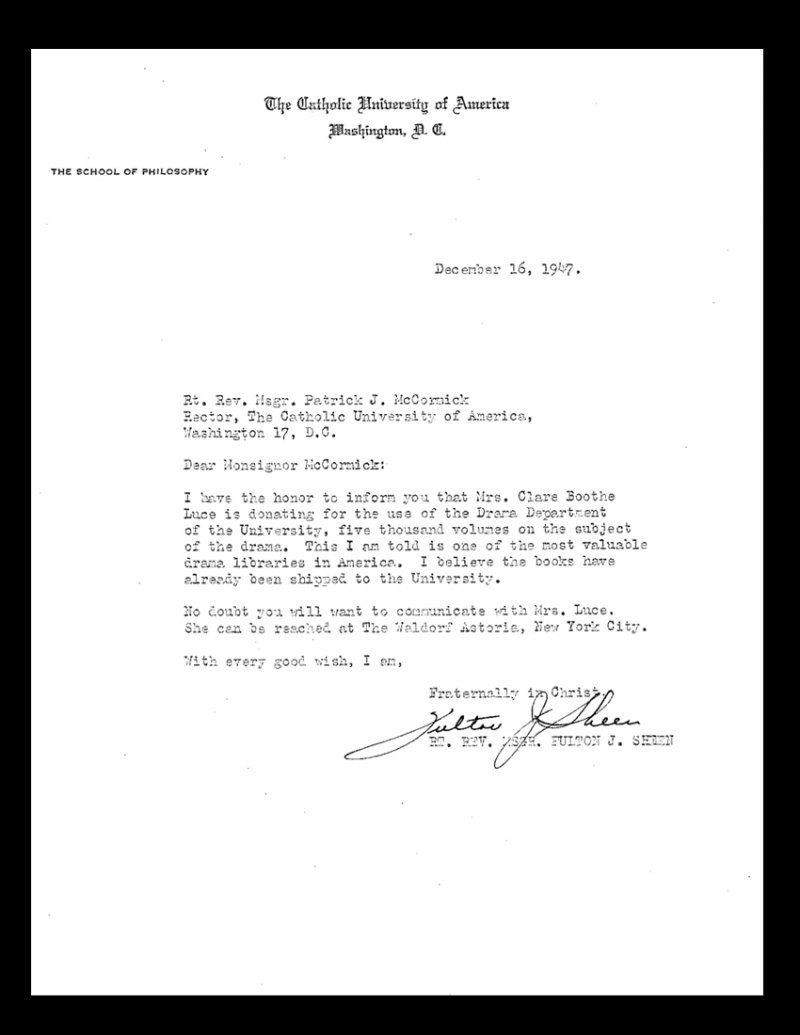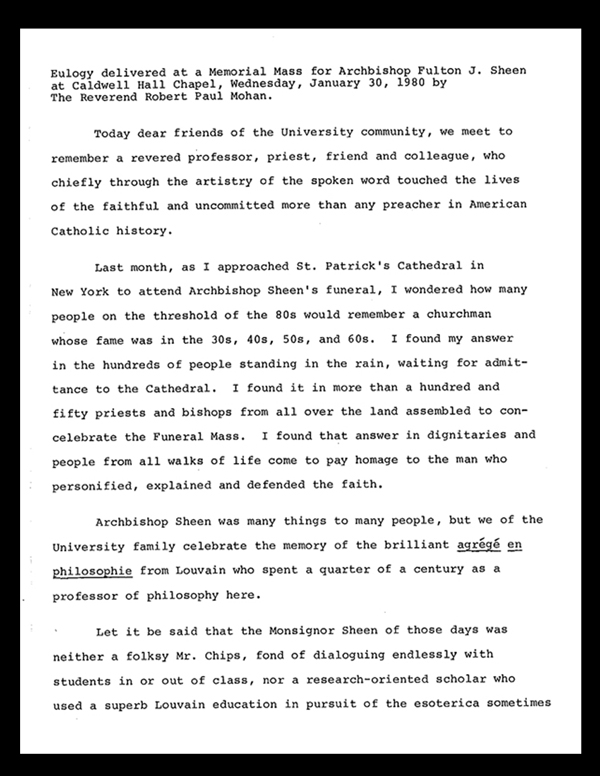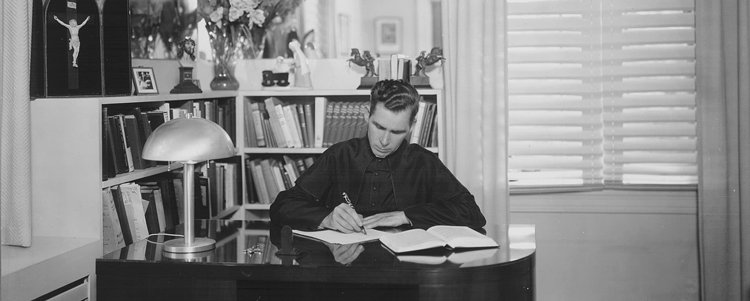
Documents from The American Catholic History Research Center and University Archives offer glimpses into the life and work of Fulton J. Sheen during his years at the University. Some of these documents, along with other records from the Archbishop Fulton J. Sheen Foundation and Sheen's own writings are excerpted below.
Click on any of the document images to view a larger version.
1931 - Letter to Vice-Rector Details Academic Credentials
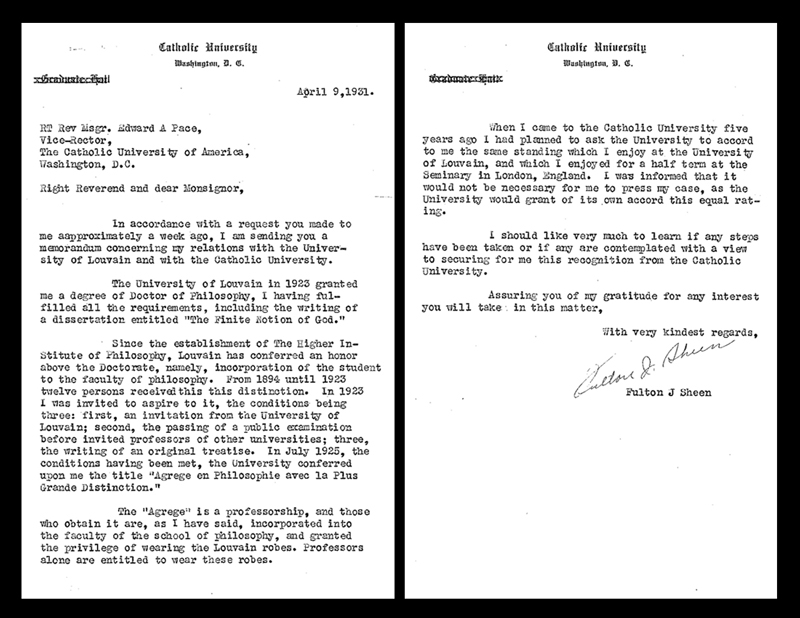 In a personal note dated April 9, 1931, to then Vice-Rector Monsignor Edward A. Pace, Father Sheen explained in detail the prestigious academic honors he was awarded by the Catholic University of Louvain, Belgium.
In a personal note dated April 9, 1931, to then Vice-Rector Monsignor Edward A. Pace, Father Sheen explained in detail the prestigious academic honors he was awarded by the Catholic University of Louvain, Belgium.
He writes, "Since the establishment of The Higher Institute of Philosophy, Louvain has conferred an honor above the Doctorate, namely, incorporation of the student to the faculty of philosophy. From 1894 until 1923 twelve persons received this distinction. In 1923 I was invited to aspire to it, the conditions being three: first, an invitation from the University of Louvain; second, the passing of a public examination before invited professors of other universities; three, the writing of an original treatise. In July 1925, the conditions having been met, the University conferred upon me the title 'Agrege en Philosophie avec la Plus Grande Distinction'."
In the note, he refers to his dissertation entitled "The Finite Notion of God," which was the basis of his first book, "God and Intelligence," published in 1925 with an introduction written by G.K. Chesterton.
1935 - Bishop of Peoria Secretly Lobbies Vatican about Sheen
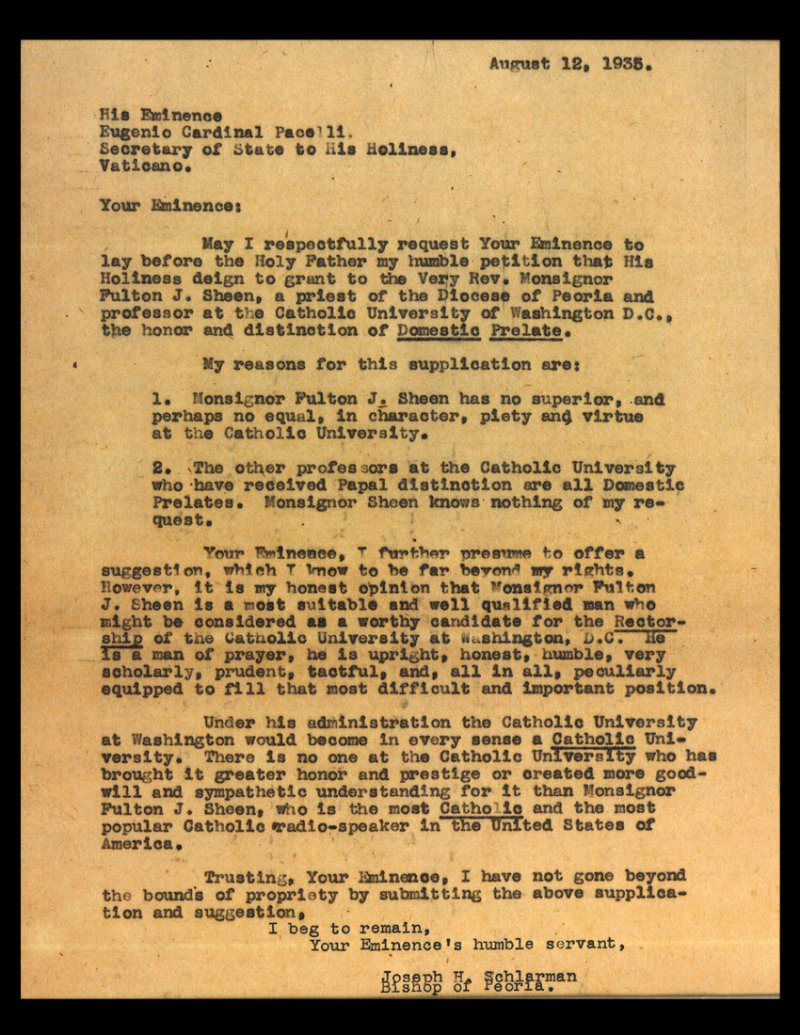 The Archbishop Fulton John Sheen Foundation in the Diocese of Peoria, Ill., obtained a copy of a 1935 letter from Bishop Joseph H. Schlarman to the Vatican recommending that Monsignor Sheen be made the rector of Catholic University.
The Archbishop Fulton John Sheen Foundation in the Diocese of Peoria, Ill., obtained a copy of a 1935 letter from Bishop Joseph H. Schlarman to the Vatican recommending that Monsignor Sheen be made the rector of Catholic University.
The bishop of Peoria, Sheen's home diocese, wrote that Monsignor Sheen "has no superior, and perhaps no equal, in character, piety and virtue at the Catholic University."
Noting that "Monsignor Sheen knows nothing of my request," Schlarman went on to say, "it is my honest opinion that Monsignor Fulton J. Sheen is a most suitable and well qualified man who might be considered as a worthy candidate for the Rectorship of the Catholic University in Washington, D.C. He is upright, honest, humble, very scholarly, prudent, tactful, and, all in all, peculiarly equipped to fill that most difficult and important position."
The Vatican secretary of state to whom this letter was sent, Cardinal Eugenio Pacelli, later became Pope Pius XII.
1937 - Personal Note from Sheen to the Rector
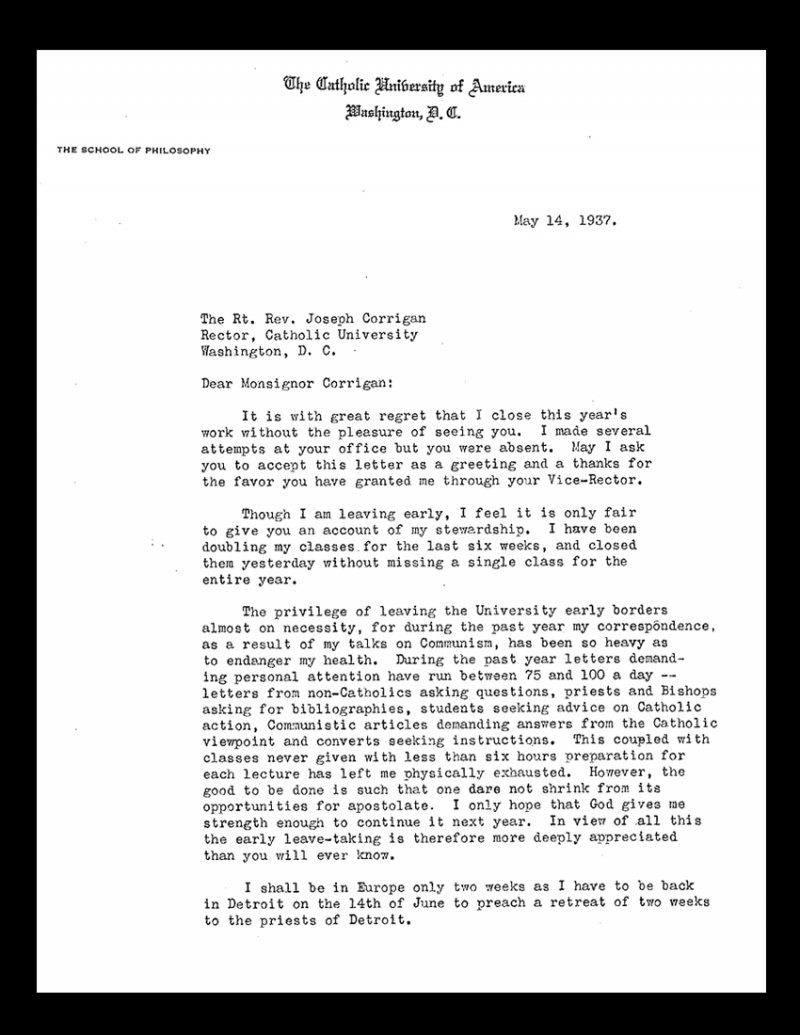 By today's standard's, Monsignor Sheen's letter of thanks for being granted permission by the rector to leave "early" is a reminder of how much the academic calendar has changed. He was departing for a trip to Europe sometime after May 14, 1937. Apparently there were several weeks of classes remaining, as Monsignor Sheen assured Monsignor Joseph Corrigan that he had been "doubling his classes for the last six weeks, and closed them yesterday without missing a single class for the entire year."
By today's standard's, Monsignor Sheen's letter of thanks for being granted permission by the rector to leave "early" is a reminder of how much the academic calendar has changed. He was departing for a trip to Europe sometime after May 14, 1937. Apparently there were several weeks of classes remaining, as Monsignor Sheen assured Monsignor Joseph Corrigan that he had been "doubling his classes for the last six weeks, and closed them yesterday without missing a single class for the entire year."
Monsignor Sheen's letter also offers a personal perspective on how demanding his schedule had become: "During the past year my correspondence, as a result of my talks on Communism, has been so heavy as to endanger my health. During the past year letters demanding personal attention have run between 75 and 100 a day. ... This coupled with classes never given with less than six hours preparation for each lecture has left me physically exhausted. However the good to be done is such that one dare not shrink from its opportunities for apostolate. I only hope that God gives me strength enough to continue it next year."
The busy professor ended his letter by assuring Corrigan "of my loyalty, service and co-operation in the upbuilding of a great University where spiritual values are primary."
1938 - High Praise for Sheen from UCLA President
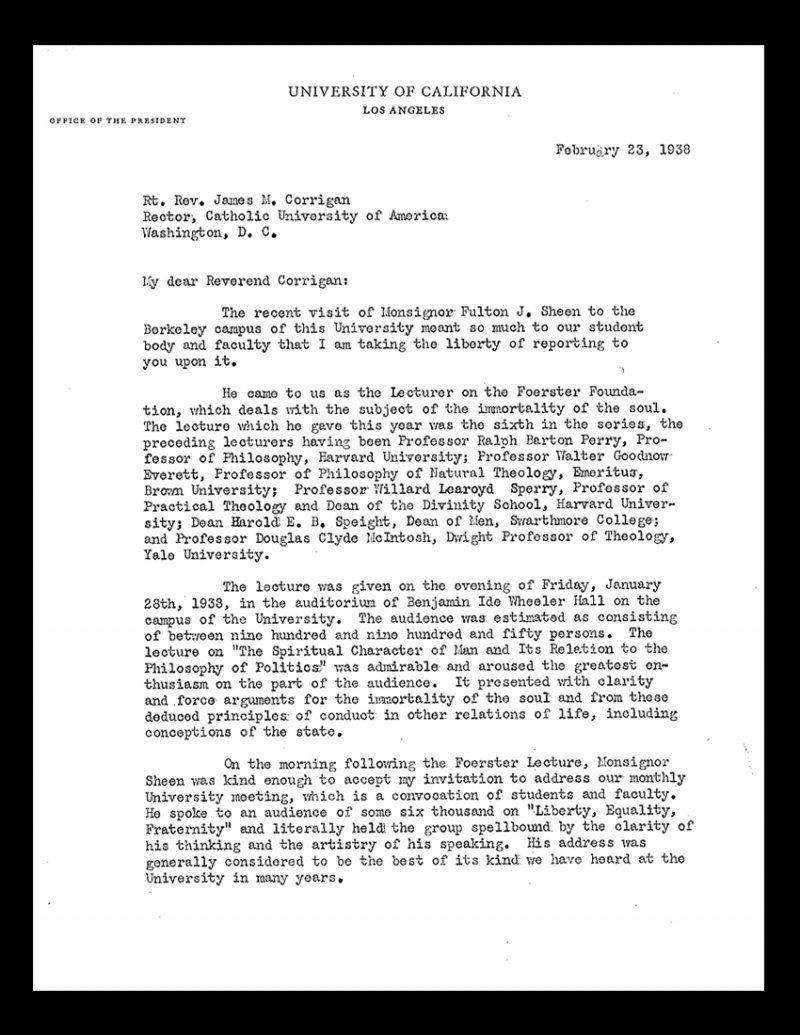 The Catholic University archive files on Fulton Sheen contain numerous requests from various organizations for Monsignor Sheen to speak - commencement addresses, homilies, retreats, academic events, and addresses to civic groups and religious organizations from all over the country. Many of these letters were addressed, not to Monsignor Sheen himself, but to the rector of the University, an indication of the considerable authority exercised by the rector at that time, at least over his priestly faculty.
The Catholic University archive files on Fulton Sheen contain numerous requests from various organizations for Monsignor Sheen to speak - commencement addresses, homilies, retreats, academic events, and addresses to civic groups and religious organizations from all over the country. Many of these letters were addressed, not to Monsignor Sheen himself, but to the rector of the University, an indication of the considerable authority exercised by the rector at that time, at least over his priestly faculty.
Also scattered throughout the Sheen files are thank-you notes from some of the organizations where Monsignor Sheen spoke. One especially significant one was addressed to Rt. Rev. James M. Corrigan, rector of Catholic University, from Robert G. Sproul, president of the University of California at Los Angeles.
Sproul reported on two talks Monsignor Sheen gave at UCLA, one to an audience of 950, another the next morning to a group of 6,000. He wrote that the professor from Catholic University "literally held the group spellbound by the clarity of his thinking and the artistry of his speaking. His address was generally considered to be the best of its kind we have heard at the University in many years."
1938 - Proposal for Institute of Catholic Culture
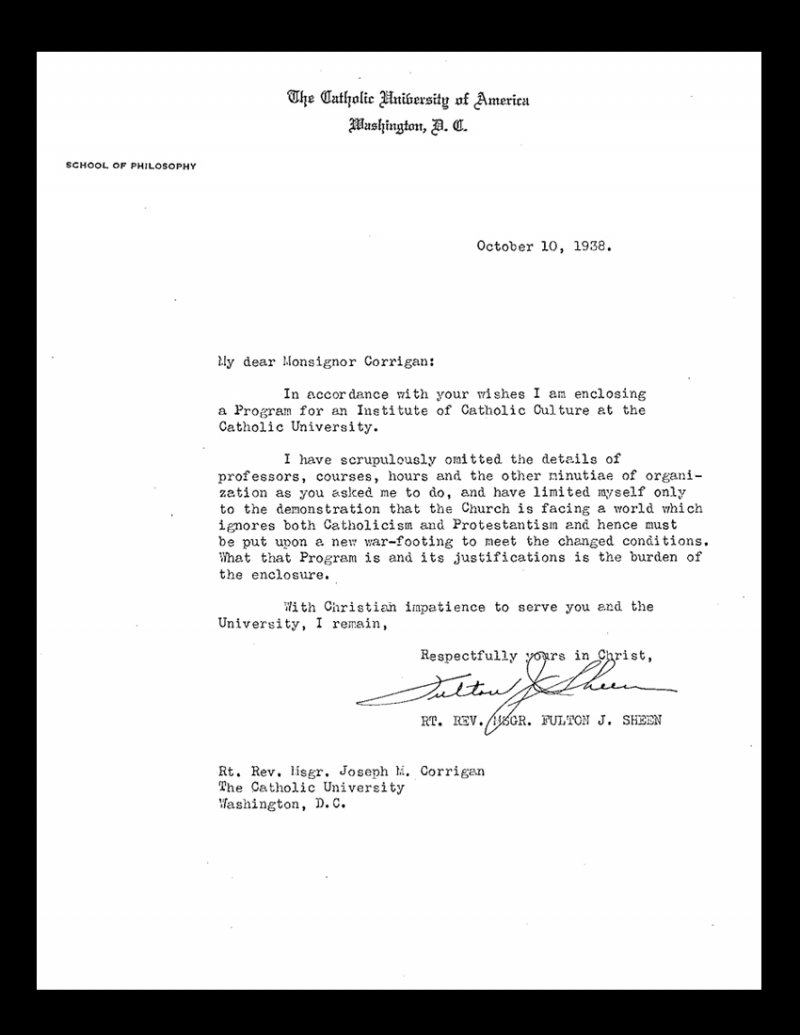 The cover letter to Monsignor Sheen's 1938 proposal for an Institute of Catholic Culture suggests that the young professor wrote it at the behest of then Rector Monsignor Joseph M. Corrigan.
The cover letter to Monsignor Sheen's 1938 proposal for an Institute of Catholic Culture suggests that the young professor wrote it at the behest of then Rector Monsignor Joseph M. Corrigan.
Central to the proposal was Sheen's idea that "the Church is facing a world which ignores both Catholicism and Protestantism and hence must be put on a new war-footing to meet the changed conditions."
The 11-page document contrasts old and new ideas in philosophy, politics, economics and religion. In the section about politics, Monsignor Sheen describes the "old" challenge to the Church as one that "glorified 'liberty of indifference', so called because it was indifferent to Truth, Goodness, Morality and Justice. Freedom meant the 'right to do whatever one pleases'."
By contrast, he summarized the "new" political challenge to the Church in this way: "Liberty of Indifference has become 'Liberty of Necessity'. The new order in its European expression places liberty not in the person, but in the collectivity: in the nation (Italy) the race (Germany) or the class (Russia). The individual who in the old order was isolated from society is now absorbed by it. Rights are born not in the soul, but in the totality. The person is secondary; the ideology is primary."
There is no archival evidence that Monsignor Sheen's proposal ever progressed beyond the document he submitted in 1938, but his prescient insights and critique of the totalitarian ideologies of the pre-World War II era became a common theme in his speaking and writing.
1940 - An Urgent Message from a New York Hospital
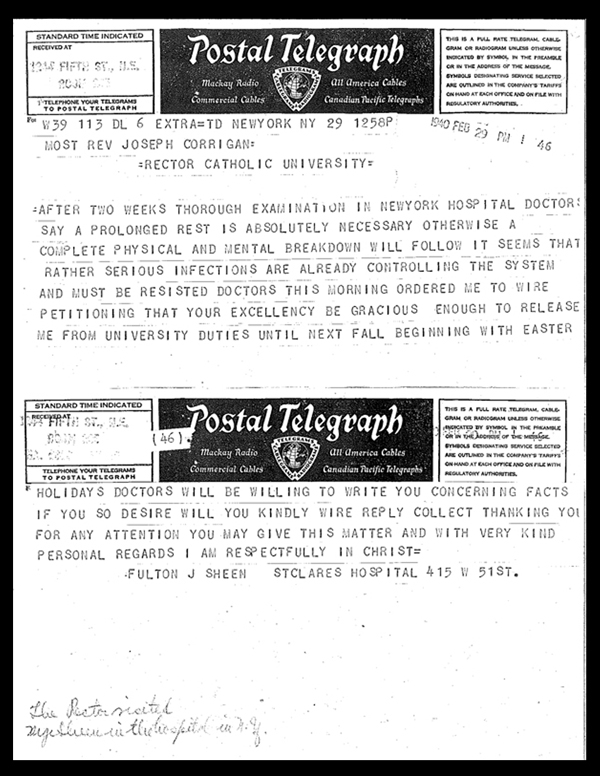 Monsignor Sheen sent this telegraph message to Bishop Joseph Corrigan, rector of the University, from a hospital bed in New York in 1940. He was suffering from exhaustion and infections that he said "are already controlling the system and must be resisted." His doctor had ordered a "prolonged rest" to avoid "a complete physical and mental breakdown. The purpose of the telegraph was to ask the rector to be released from his University duties for several months.
Monsignor Sheen sent this telegraph message to Bishop Joseph Corrigan, rector of the University, from a hospital bed in New York in 1940. He was suffering from exhaustion and infections that he said "are already controlling the system and must be resisted." His doctor had ordered a "prolonged rest" to avoid "a complete physical and mental breakdown. The purpose of the telegraph was to ask the rector to be released from his University duties for several months.
The handwritten note in the lower left corner says, "The Rector visited Msgr. Sheen in the hospital in N.Y."
1943 - First Dated Entry in Sheen's FBI File
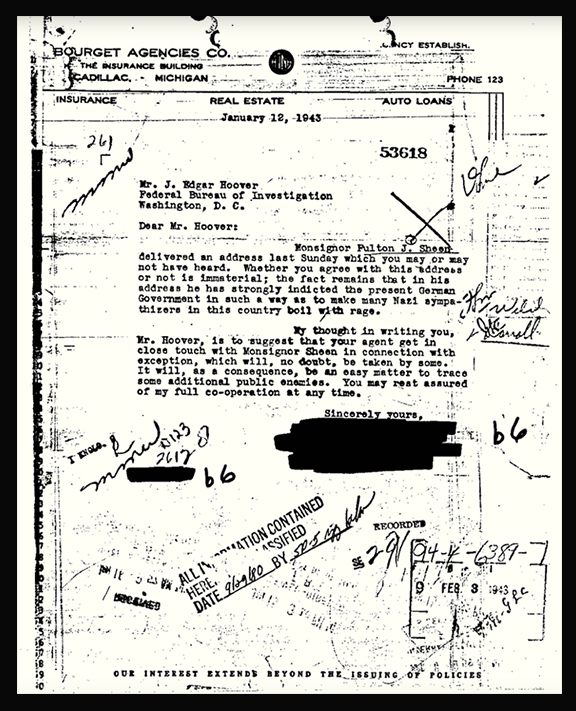 Given the political climate in the mid-20th century, Sheen's prominence, and his many writings and talks criticizing Communism and Nazism, it is not surprising that the FBI compiled an extensive file on Sheen.
Given the political climate in the mid-20th century, Sheen's prominence, and his many writings and talks criticizing Communism and Nazism, it is not surprising that the FBI compiled an extensive file on Sheen.
The first entry is a letter to FBI Director J. Edgar Hoover apparently from someone who worked at an insurance agency in Michigan. The letter writer warned Hoover that a recent talk by Sheen was so critical of "the present German Government" that it would "make many Nazi sympathizers boil with rage."
The file contains other letters to the FBI as well as numerous news clippings and other writings by and about Sheen.
> View the entire Sheen FBI file
1947 - Sheen's Résumé Lists Degrees, Honors, Publications
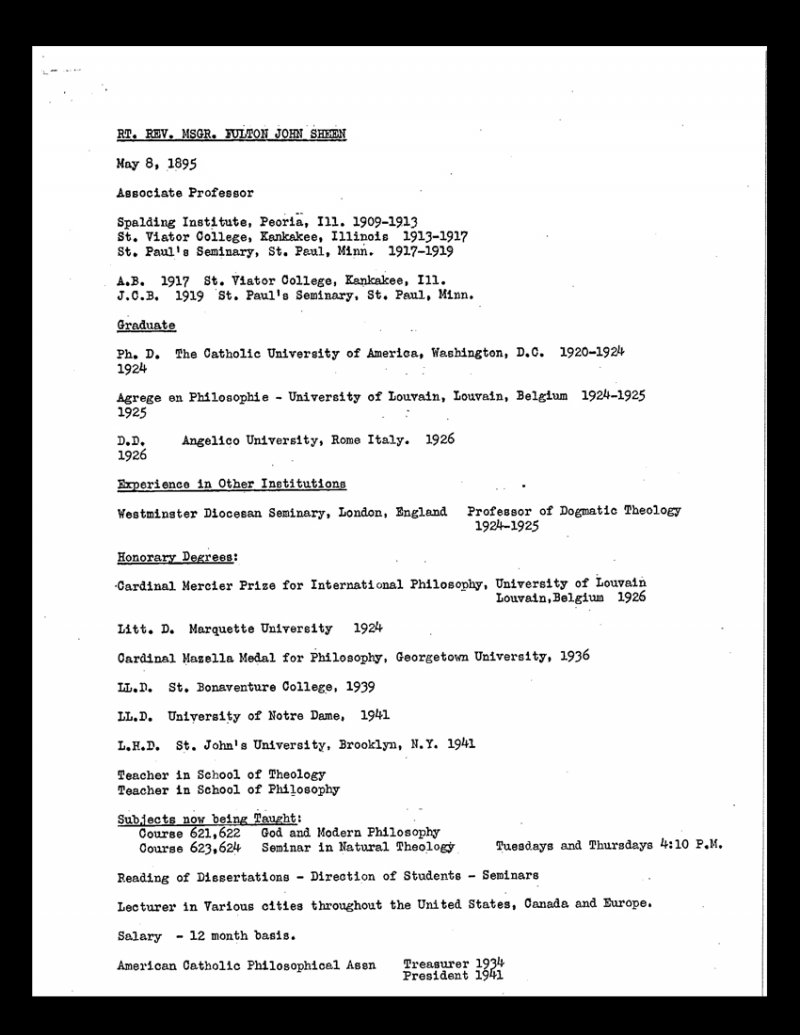 In three type-written pages beneath the all-caps, underlined heading RT. REV. MSGR. FULTON JOHN SHEEN, the birth date, "May 8, 1895," and title, "Associate Professor," Sheen sums up his credentials and accomplishments. He lists degrees from three graduate institutions and seven honorary degrees. He notes his current courses as "God and Modern Philosophy" and "Seminar in Natural Theology." He mentions among other details, "Lecturer in Various cities throughout the United States, Canada and Europe," as well as "American Catholic Philosophical Assn. Treasurer 1934 and President 1941." He also lists 32 books, 13 booklets, and 25 pamphlets.
In three type-written pages beneath the all-caps, underlined heading RT. REV. MSGR. FULTON JOHN SHEEN, the birth date, "May 8, 1895," and title, "Associate Professor," Sheen sums up his credentials and accomplishments. He lists degrees from three graduate institutions and seven honorary degrees. He notes his current courses as "God and Modern Philosophy" and "Seminar in Natural Theology." He mentions among other details, "Lecturer in Various cities throughout the United States, Canada and Europe," as well as "American Catholic Philosophical Assn. Treasurer 1934 and President 1941." He also lists 32 books, 13 booklets, and 25 pamphlets.
1950 - Sheen Resigns from Catholic University
On September 12, 1950, Monsignor Sheen "reluctantly" submitted a letter of resignation to Bishop Patrick J. McCormick, rector of The Catholic University of America. It was to be effective October 1.
He told the rector, "Word has just come from the Propagation of the Faith in Rome appointing me its National Director in the Archdiocese of New York."
The letter expressed Monsignor Sheen's profound gratitude to the University. He wrote: "As the sun often gives brilliance to the stone that lacks lustre, so does the University magnify the worth and prestige of those who are fortunate enough to labor under its aegis. There is no doubt that I would never have been given this new charge, were it not for the distinction which the University sheds on those who are privileged to serve it.
"After twenty-three years of happy association, I take leave of the Catholic University academically, but not spiritually, for though I served as a teacher, I was nevertheless a pupil of its collective wisdom and I shall therefore always be bound to it as a willing debtor."
CUA's Clare Boothe Luce Connection
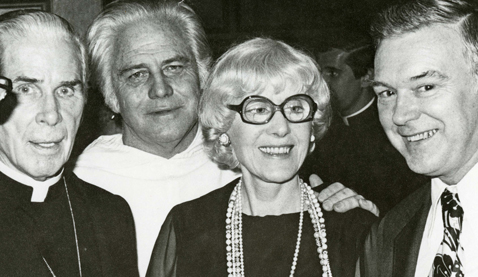
In this undated photograph, Archbishop Fulton J. Sheen is pictured with Rev. Gilbert Hartke, O.P., founder of Catholic University's speech and drama department; Clare Boothe Luce, playwright and former congresswoman from Connecticut and U.S. ambassador to Italy; and Clarence Walton, who served as president of the University from 1969 to 1978.
Archbishop Fulton Sheen's association with playwright and prominent political figure Clare Boothe Luce came after the untimely death of her 19 year-old daughter. Luce faced a spiritual struggle over the compassion and mercy of God. She turned to Archbishop Sheen for spiritual advice.
Through her struggle she became a Roman Catholic in 1946 and her writing energies thereafter focused on the spiritual life. She wrote the screenplay for a movie on the lives of two nuns, "Come to the Stable," that received an Oscar nomination for Best Motion Picture of the year 1949.
Monsignor Sheen had written to Monsignor Patrick J. McCormick in 1947 about Luce's intention to donate "five thousand volumes" on Drama to the University's Drama Department, but according to archival records it wasn't until 1973 that she made a donation consisting of "notebooks and scrapbooks collected and compiled by Clare Boothe Luce... [and] announcements, programs, and review clippings from musical and theatrical life (including both classical and popular music) in the United States from 1891 to 1919."
1980 - Sheen's Former Student Gives Eulogy at Memorial Service
Monsignor Robert Paul Mohan delivered this eulogy at a memorial Mass for Archbishop Fulton J. Sheen on January 30, 1980, in Caldwell Chapel. Mohan was a professor of philosophy at Catholic University from 1951 to 1990. He also studied under Monsignor Sheen when he was a student at CUA.
Mohan's eulogy offers a personal reflection on Monsignor Sheen's life and impact on the University and the world.
"Today dear friends of the University community, we meet to remember a revered professor, priest, friend and colleague, who chiefly through the artistry of the spoken word touched the lives of the faithful and uncommitted more than any other preacher in American Catholic history," Mohan said.
He went on to recount observations about Monsignor Sheen's style as a professor and his accomplishments as a mass-media communicator and "convert-maker." As he wrapped up his eulogy, Mohan brought the focus back to Archbishop Sheen's priestly ministry and personal piety: "Archbishop Sheen's greatest strength was not in the perfection of his oratory, nor in the breadth of his vision, nor the extent of his charities, but in the life of prayer that gave all these lesser things their meaning."

